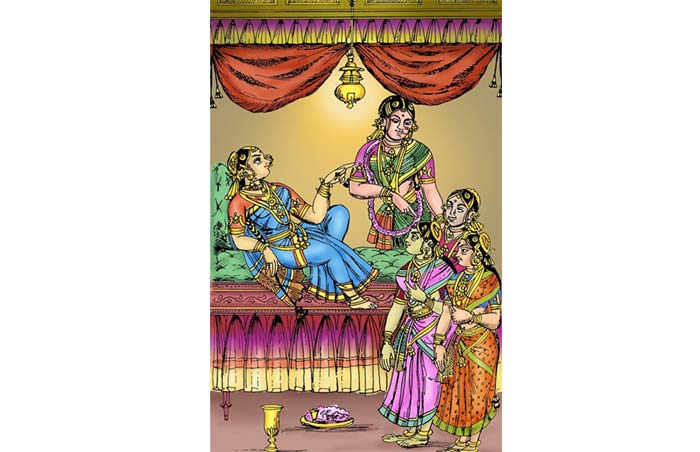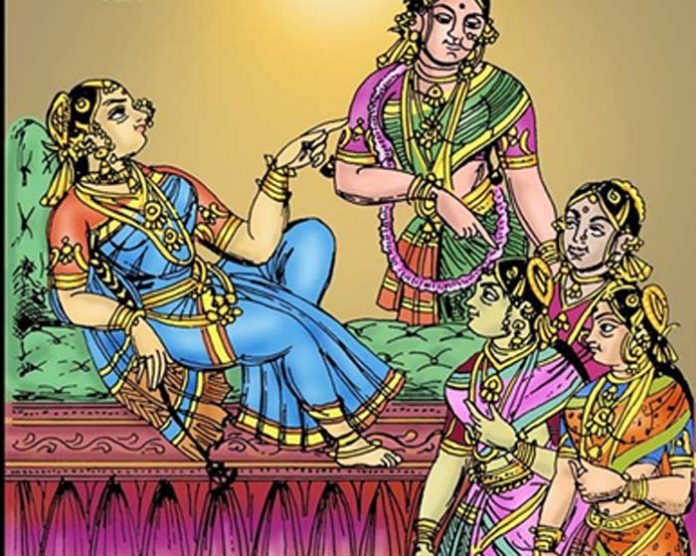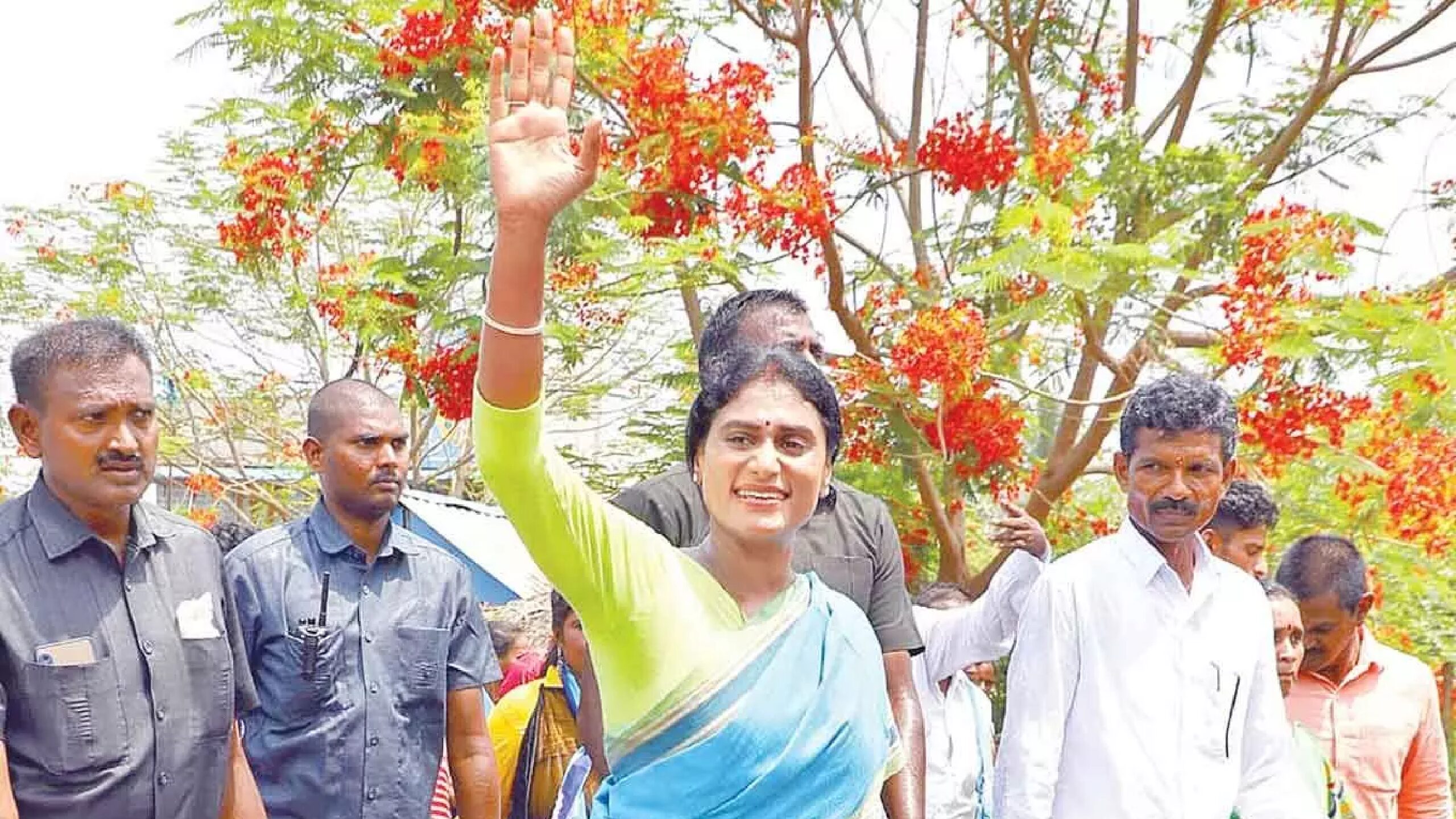- Tiruppavai 15
Ellay! Illam Kiliye! Innam urungudhyo!
Chill enru azhayen min Nangaimeer! Podharukinren
Vallai un katturaikal pande un vaai arithum
Valleergal neengale! Naanthan aayiduga!
ollai nee podaai, unakkenna verudayai
Ellarum pondhaaro? Pondhaar pondhu ennikkol
Vallaanai-k-konraanai, maatraarai maatrazhikka
Vallaanai Mayanai-p-paadu-el or empaavaai
O Sweet Parrot, We all came, Are you still sleeping,
The Complete Person”, “Don’t call with chilling sound, I will just come”
“We know your clever skills in talk”, “you have more skill, Me also perhaps”
“Join us quickly, do you have any other purpose”, “whether all came”,
“Oh, if you want, come out count us all in your corridor”,
We praise enchanting kid that plucked tusks, killed rogue elephant,
Indomitable to destroy brutal strength of enemy demons
Come on, join, listen about the adventures of the Little angel.
[Transliteration, followed by translation from Tamil in bold and italics]
Goda coined the Hello type word first
The 15th song starts with word “Elle” which is an expression like ‘hello”, a greeting in English. Oxford English Dictionary says: “hello is an alteration of hallo, hollo, which came from Old High German “halâ, holâ, emphatic imperative of halôn, holôn to fetch, used especially in hailing a ferryman”. It also connects the development of hello to the influence of an earlier form, holla, whose origin is in the French holà (roughly, ‘whoa there!’, from French là ‘there’). As in addition to hello, halloo, hallo, hollo, hullo and (rarely) hillo also exist as variants or related words.
Edison & Bell
The use of hello as a telephone greeting has been credited to Thomas Edison; according to one source, he expressed his surprise with a misheard Hullo. Alexander Graham Bell initially used Ahoy (as used on ships) as a telephone greeting.
Webster’s dictionary from 1913 traces the etymology of holloa to the Old English halow and suggests: “Perhaps from ah + lo; compare Anglo Saxon ealā”. According to the American Heritage Dictionary, hallo is a modification of the obsolete holla (stop!), perhaps from Old French hola (ho, ho! + la, there, from Latin illac, that way).
First: Goda
Look at the similarity, much earlier Goda, or Andal, 7th or 8th Century woman Alwar, called it “Elle” as greeting word to begin conversation, in 15th Pashuram. We should, perhaps claim that Goda invented the first such word Elle, which now became very popularly – hello. Whole world every day uses this expression. Goda is the inventor of Elle that gradually became Hello.
The young parrot like lady
Goda and other Gopikas were waiting outside the house of a beautiful and clever lady, who heard all singing for Krishna. She started humming those tunes. It was very sweet to listen that tune. That is why they addressed Ilan Kiliye. In Tamil Kile, means the parrot. Ilan means very young. This pashuram is composed of conversation between Goda outside and Gopika inside like many others from 6th to 14th songs. In other pashurams conversation is part of it, whereas here it is full of dialogues between them.
Goda: “O young parrot, we all came for you; You know that, Are you still sleeping?” She and her colleagues wanted this Gopika to join them so that they get Krishna easily. They were praising her.
Gopika inside: “O friends, don’t shout with chilling effect, I say, I am unhappy as I am separated from all of you and it is not proper for you to praise me”. She assessed that Gopikas and Goda might be suspecting presence of Krishna with her.
Goda: “You are a perfect personality, we know”.
Gopika: “No, not at all. Krishna is not with me. You are perfect persons, not me…Fine, I am coming to join you anyway”.
Goda: “You are very clever and skillful in sweet talk. We know since a long time about your satire and hard hitting words”.
Gopika: “Not me, you are very clever, you are calling me efficient, but I am unhappy as Krishna is far away, whereas you are all planning to reach Sri Krishna. I know it’s my mistake that I did not join you in time. Ok you are right that I am a hard-nut”.
Goda: “Okay, then come. Do you have any other purpose?”
Gopika: “Whether all of them arrived”.
Goda: “Yes, if you want, come and count, we want to see you, Dear”
Gopika: “What shall we do together?”
Goda: That wonderful person with surprising adventures, Krishna who killed Kuvalayapeedam, the rogue elephant of Kamsa, by plucking out its tusks and used the same as weapons to kill it. He is mysterious hero, who can defeat all the mischievous manipulations of enemies. He can kill the enmity among enemies. Let us all sing together about that wonderful little angel, Krishna.
Also Read : Tiruppani Aalwar merges into Ranganatha
Parrot indicates Acharya
They referred to as parrot. When a person is immersed in meditation of the Paramatma, even the sweet voice of Parrot irritates. Hence she tells them not to make chilling sound. Immediately she says that it was her mistake not to have joined them in-time. They surrender, consider them as lower or subordinate than the others. They shed the ego and tolerate the insulting words. Ego-less, humble and humility is the character of real Vaishnava.

Vaishnava’s generally greet others with ‘Sarvaaparaadhini”, I am the one who committed so many mistakes…. Bharatha says, “it was my mistake, my actions in earlier Janma that caused Rama to go in exile, its neither my mother, nor king, nor Mandhara, it is me”.
Seetha repents
Seetha also says she is suffering in Sri Lanka because of her own wrongs. I did a small and very big sin. Her small wrong was when Rama not inclined to take Seetha along with her into the exile, she provoked Rama in a satire saying “My father thought that he was giving his daughter to a male person”. But, when she blamed with harsh words and all sorts of allegations, Lakshmana for not rushing to save Rama after hearing the words “Haa Seetha, Haa Lakshmana…” in Rama’s voice. She says: I am suffering in Lanka for the last ten months because of this major mistake against the devotee of Rama. Abusing Bhagawatha is worst crime compared to abuse of Bhagawan Himself.
Also Read : Ego and Beauty are obstacles to reach Krishna or Rama
Kurattaalwar’s devotion
Devoted disciple of Ramanuja, Kurattalwar goes to Srirangam. It was under control of anti-Vishnu king Chola who ordered not to allow any if related to Ramanuja, into Ranganath Temple. The soldiers there explain this order to Kurattalwar but tell him that if you abandon relation with Ramanuja you can enter the temple. He refuses to enter if it costs him his association with Bhagavatottama Ramanuja. He never adopted anything if that is against Bhagavata’s (relating to devotees of Bhagawan) even if that is about Bhagawan.
Goda also narrates importance of devotees in this Pashuram. Here Parrot means the Acharya who gains the same form as of Bhagawan. Sweet sounds of Parrot means those who have great love for devotees. Goda calls Gopika inside to join us to have association with the devotees.
In this part of the song, Goda pays tributes “Srimathe Sathagopaya namah”. The tenth Alwar that was waken up is Tirumangai Alwar, who followed the Nammalwar, as a parrot did. This indication refers to Tirumangai. Alwar also agreed with this aspect. He says Nammalwaar who is also known as Sathagopa, taught him Tiruvai mozhi. Tirumangai slept over for years, hence also the reference points to him. He was considered him as a divine incarnation of Sharanga, Vishnu’s bow.
Also Read : Lakshmana serves Ram, Bharata meditates Him




